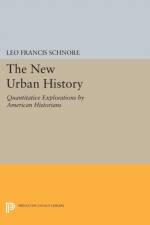- Quantitative Explorations by American Historians
av Leo Francis Schnore
595 - 1 369
As part of the new consciousness concerning the history of the American city, younger historians, economists, and geographers working with quantitative methods on urban-historical problems were brought together at a conference sponsored by the History Advisory Committee of the Mathematical Social Science Board. The papers in this volume, products of the conference, represent the pioneer stage of quantitative exploration in United States urban history.United by a common concern with the growth of cities in society and the effects of growth on the internal organization and related social order of cities, the papers deal with such topics as jobs, residences, neighborhoods, adjustment, status, accommodation, innovation, and location. The authors attempt to measure some of the attitudes and behavior of capitalists, workers, immigrants, and freedmen, and speculate on the ways in which households, firms, and assorted social groupings cope with changing physical and social environments.The essays demonstrate the productive use of quantitative research techniques, ranging from simple enumeration of data in tabular form to sophisticated types of statistical hypothesis- testing and mathematical modeling.Originally published in 1975.The Princeton Legacy Library uses the latest print-on-demand technology to again make available previously out-of-print books from the distinguished backlist of Princeton University Press. These editions preserve the original texts of these important books while presenting them in durable paperback and hardcover editions. The goal of the Princeton Legacy Library is to vastly increase access to the rich scholarly heritage found in the thousands of books published by Princeton University Press since its founding in 1905.

